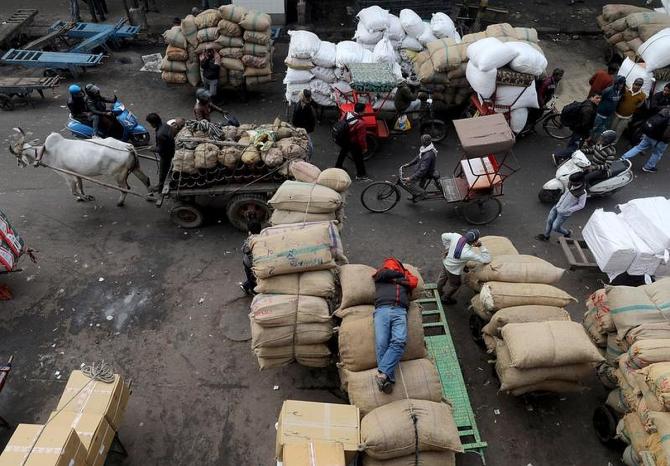India is likely to grow by 7.5 per cent in the first quarter of the current financial year, driven by rising aggregate demand and non-food spending in the rural economy, according to an article in the RBI's May Bulletin released on Tuesday.

The Indian economy has demonstrated marked resilience in the face of geopolitical headwinds impacting the supply chain, said an article on the state of the economy published in the May Bulletin.
"According to the economic activity index (EAI), activity rebounded in April, and early estimates suggest that GDP growth for Q1:2024-25 is likely to remain close to 7.5 per cent," it said.
The economic activity index (EAI) was constructed by extracting the common trend underlying twenty-seven high-frequency indicators of economic activity, using a Dynamic Factor Model.
EAI was scaled to 100 in February 2020 and 0 in April 2020, the worst affected month due to mobility restrictions.
Meanwhile, the government will be releasing the quarterly GDP estimates for January-March, 2024 (Q4 2023-24), and provisional estimates of National Income for the year 2023-24 on May 31.
The Indian economy grew 8.2 per cent in the June quarter, 8.1 per cent in the September quarter and 8.4 per cent in the December quarter of 2023-24.
The article noted that high-frequency indicators point towards sustained momentum in domestic demand conditions in April 2024.
Toll collections increased by 8.6 per cent (y-o-y) in April 2024.
Automobile sales increased by 25.4 per cent (y-o-y) in April 2024, led by strong growth in the two-wheelers and three-wheelers segment, while passenger vehicles recorded the highest-ever monthly sales.
"There is a growing optimism that India is on the cusp of a long-awaited economic take-off. Recent indicators are pointing to a quickening of the momentum of aggregate demand," said the article, prepared by a team led by Reserve Bank Deputy Governor Michael Debabrata Patra.
Non-food spending is being pushed up by the green shoots of rural spending recovery.
A modest easing of headline inflation in the reading for April 2024 confirms the expectation that an uneven and lagged pace of alignment with the target is underway.
It also noted that for the first time in at least two years, rural demand for fast-moving consumer goods (FMCG) has outpaced urban markets in the quarter just gone by.
FMCG volume growth of 6.5 per cent was driven by rural growth of 7.6 per cent relative to urban growth of 5.7 per cent on the back of robust demand for home and personal care products.
Turning to private investment, for listed private manufacturing companies, earnings remained the major source of funds during the second half of 2023-24, it said.
Results that have been declared by listed corporates so far indicate that they closed the financial year 2023-24 with the highest growth in quarterly revenues registered in January-March 2024.
"A modest easing of headline inflation in the reading for April 2024 confirmed our expectation that an uneven pace of alignment with the target is underway," the authors said.
The prices of vegetables, cereals, pulses, meat and fish in the food category may keep the headline elevated and closer to 5 per cent in the near term, in line with projections set out in the April Monetary Policy Committee (MPC) resolution in spite of deflation in fuel prices and further softening of core inflation to a new historic low, they said.
The central bank, however, said the views expressed in the Bulletin article are of the authors and do not represent the views of the Reserve Bank of India.











 © 2025
© 2025